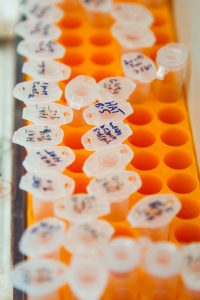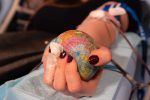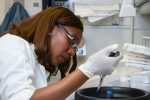As technology advances, this has resulted in opening more possibilities for detecting new diseases through blood testing.
Moreover, I do not know how many times we have already mentioned that phlebotomy is a leading growing branch, so more jobs are created.
Page Navigation
Where Can You Get a Job as a Phlebotomist?
Hospitals
We must first mention the hospitals because as many as 52% of phlebotomists work in hospitals.
The most significant benefit of working in a hospital is that you work with many people and learn to work as part of the system.
Hospitals are busy and exciting places to work.
You can be proud of your work, knowing that you can help many people’s lives every day.
It is essential to mention that as a phlebotomist in a hospital, you may see more action than someone practicing phlebotomy in a smaller facility.
Phlebotomists in the hospital are on their feet most of the time.
They may also need to move quickly to bring blood samples to the lab on the spot.
The best way to get a job in a hospital is to complete the training there.
Some hospitals need phlebotomists so much that they offer training programs or internships.
When you go through a home program, you will probably be engaged.
It is important to note that it is best to complete hospital training for better employment chances because hospitals know how to hire successful trainees after training.
It is also essential to note that working as a phlebotomist in a hospital is not for everyone because you can see many distressing things and health conditions.
Nursing Homes
As people get older, blood tests should be done more often to detect the patient’s condition.
Larger nursing homes are looking for trained phlebotomists who will work in a diverse environment, unlike hospitals.
You will have a lot of work every day because there will be many people and because the nursing houses do not have a lab inside, so they have to be submitted in person to the laboratory after labeling and sampling.
Again, most nursing homes do not have an on-site laboratory, so it is up to you to make sure the blood samples are labeled and delivered correctly.
These samples will go to each patient’s doctor.
The American Red Cross
Many people do not realize that phlebotomists are in demand in non-medical facilities, such as the Red Cross, which needs trained phlebotomists volunteers to draw blood for donor purposes.
Many Red Cross phlebotomists work voluntarily.
If there is a blood draw in the city, they look for volunteers for a day or two to meet the needs of people who come to donate blood.
The biggest problem is that most people do not understand that many non-medical facilities are always looking for phlebotomists, such as the American Red Cross.
However, the Red Cross also has full-time and part-time employees based throughout the country.
These phlebotomists can travel to various blood vessels or go to areas of disaster where blood is needed.
Private Practices and Clinics
If you do not want to work in an overcrowded hospital, you can always work in a minor clinic.
When working in a smaller medical facility, you may not meet so many people a day, but you will still have enough work to make your day complete.
You are also unlikely to see traumatic injuries.
Besides, the work remains the same.
Substantial to say is that one potential disadvantage of working in a smaller medical facility is that you may not have many resources.
For example, hospitals usually have a laboratory on-site.
So, along with labeling and organizing blood bottles, it is your responsibility to make sure they arrive at a nearby laboratory.
This can be a little frustrating at first.
This means that you need to pay even more attention to detail and be careful when transferring blood samples.
If you are looking for something lower but still want to work in a medical facility, it may be ideal for working in a small clinic.
Private practices sometimes use full-time or part-time phlebotomists.
If the hospital’s fast pace seems overwhelming, a smaller facility like this may be ideal for you.
People considering a career change in phlebotomy may want to start here.
VA Clinics/Hospitals
Many veterans are growing old, so there is a tremendous demand for phlebotomists who often work as volunteers in these clinics but are not very rare, and those who work full-time.
Medical care for veterans is becoming a significant problem in US veterans’ hospitals and clinics.
Like working in a nursing home, the elderly need to have their blood tested regularly.
Early detection of a possible condition or disease will facilitate treatment in the elderly.
Working at a VA clinic as a phlebotomist can often be a volunteer opportunity.
But larger hospitals in VA can pay you to stay a full-time employee.
Working in such a place is an advantageous career option and a great way to get back.
Whether you find work with a veterans’ hospital or choose to volunteer in your free time, it can be an enriching experience to work with veterans daily.
It is essential to note that veterans’ medical care is becoming a significant problem in US veterans’ hospitals and clinics, requiring medical staff to care for our military veterinarians without forcing them to pay the total amount.
Working as a phlebotomist, even as a volunteer, is a good opportunity for an excellent start, which in the future will be your support in finding a better job.
Emergency Clinics
These clinics are usually open 24 hours a day.
So it means that as a phlebotomist, you can work in the morning or the evening for those who prefer night shifts.
Emergency clinics usually do not see any trauma in the hospital.
But they see patients who think their condition is severe enough and needs urgent attention.
Because cases that usually come to an emergency clinic can be severe, patients look forward to hearing the results immediately.
Having a blood test is one of the first things a patient should do before seeing a doctor.
The emergency clinic’s atmosphere is almost like a hospital.
You may be on your feet for a long time and need to move fast.
But it will also help people just as quickly, and as we said before, these clinics are usually open 24 hours a day.
Work as a Mobile Phlebotomist
Due to the high demand for phlebotomists, some choose to become phlebotomists/travelers.
This is a freelance position that offers many conditions for progress.
Various institutions and organizations hire mobile phlebotomists as needed.
For example, a veteran hospital may not need a regular staff phlebotomist.
So when they have patients who need blood, they will count on a traveling phlebotomist.
Working as a mobile phlebotomist offers many employment options, from working in a hospital to working with donors at local blood drives.
What Are Other Places That Phlebotomists Can Work in as Well?
Most jobs in phlebotomy offer at least some type of flexibility.
This includes working in:
Community health centers: Some communities have health homes and clinics that care for the poor.
Medical professionals volunteer here for free for their time and talents to give people the help they need.
Drug treatment centers: Drug treatment centers often have a considerable demand for phlebotomists to make sure their patients follow the rehabilitation process correctly.
A blood test can show the presence of different types of drugs in the blood and how long they have been present in the blood.
Work as a Volunteer Internationally
There are so many countries around the world that do not have access to quality health care.
Thus, organizations like Médecins Sans Frontières (Doctors Without Borders) go everywhere to provide services.
Not only doctors go on trips like these.
Phlebotomists are needed to take blood as well.
Blood sampling can help doctors determine what could be wrong with someone who does not have regular medical care access.
If you are interested in traveling and want to help those in need, this is a great option.
Phlebotomist’s Qualities
No matter how good you are at learning and even if you can get a certificate, the profession of a phlebotomist is not for everyone, so before you decide to commit to phlebotomy, pay attention to whether you have the following characteristics:
The most important qualities to have are compassion and patience, which means dealing with many different types of people every day.
Some will be old; others will be children.
You’ll even have unpleasant patients.
Being able to deal with any person is vital.
Understand their situation and that they may not be thrilled to receive blood.
A good phlebotomist can calm his patients and ensure that the experience is more bearable for them.
Above all, you need to be a good conversationalist, which means that you need to be able to talk to them along with working only with patients.
But it will also ensure that everything goes smoothly through the process.
Among other essential things a phlebotomist should possess are strong organizational skills.
What does that actually mean?
The phlebotomist should be highly organized.
Not only do you need to collect blood bottles, but they also need to be labeled appropriately.
This allows the lab to test them and find results.
Paying attention to detail is essential.
You probably already know that it is essential to be clean and efficient when working as a phlebotomist.
In fact, one of the most critical qualities a phlebotomist can have is tidiness.
You should always have the right equipment on hand, and neatly placed on a tray before meeting a patient.
The phlebotomist should check that everything is clean and sterile when working with a patient.
When finished, all tools and equipment should be cleaned appropriately.
And last but not least, a phlebotomist needs to have the ability to follow the rules.
Basically, each object will have its own set of rules.
Knowing how to follow every detail is essential.
It can help ensure your safety and well-being, as well as that of your patients.
The Bottom Line
From all of the above, we can conclude that the most crucial thing to say is that as one of the fastest-growing branches, phlebotomy offers a lot of flexibility and variation resulting in numerous options for advancement.
The phlebotomist’s work environment depends on where you find work.
In most cases, you will be very much on your feet.
The background can be affected if blood samples are urgently needed.
One of the biggest things about this career is choosing your environment based on where you want to work.
You can select the type of climate based on your experience and level of physical endurance.
In fact, most phlebotomy jobs offer some kind of flexibility.
Even in hospitals, you usually need to be able to find extra time.
Remember, it is still a starting point.
Although vital, you will not have to work the same shifts as a doctor or specialist.
You can work particularly anywhere from hospitals to local blood donor centers.
In the beginning, it may not be easy to build a customer base.
But once you get a few places to trust your services, you can create a successful career with your experience.
This page is also available in Spanish.










